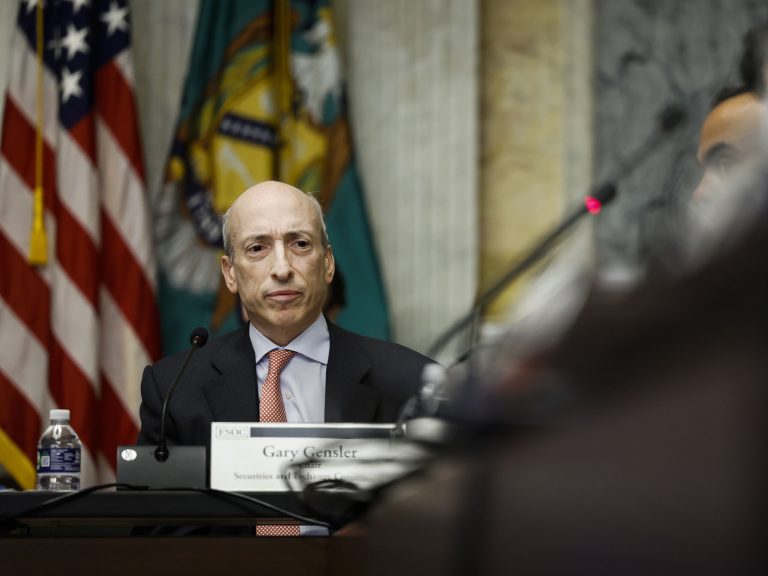House Republicans Launch Investigation into Gary Gensler’s Deleted SEC Text Messages


A group of Republican leaders in the U.S. House of Representatives initiated an oversight probe into the deletion of nearly a year’s worth of text messages from former Securities and Exchange Commission (SEC) Chair Gary Gensler’s government-issued phone.
The investigation, led by House Financial Services Committee Chairman French Hill (R-Ark.), along with Reps. Ann Wagner (R-Mo.), Dan Meuser (R-Pa.), and Bryan Steil (R-Wis.), focuses on the circumstances surrounding the loss of these communications, which occurred between October 18, 2022, and September 6, 2023.
This period overlapped with the SEC’s most aggressive enforcement actions against the cryptocurrency industry, including high-profile lawsuits against firms like Coinbase and Binance.
Register for Tekedia Mini-MBA edition 18 (Sep 15 – Dec 6, 2025): registration continues.
Tekedia AI in Business Masterclass opens registrations.
Join Tekedia Capital Syndicate and co-invest in great global startups.
Register for Tekedia AI Lab: From Technical Design to Deployment.
According to a September 2025 report from the SEC’s Office of the Inspector General (OIG), the deletions resulted from “avoidable errors” in the agency’s information technology (IT) systems.
Gensler’s phone became inactive in July 2023 due to a communication failure with the SEC’s device management system. In August 2023, the Office of Information Technology (OIT) implemented a new automated “45-day wipe” policy for inactive devices, which erased the texts without proper backups or alerts being addressed.
Additional issues involved poor change management, unpatched software vulnerabilities, and inadequate record preservation protocols, violating federal recordkeeping laws under the Federal Records Act.

The OIG reviewed about 1,500 recovered messages from colleagues and other sources, determining that many of the lost texts qualified as federal records. These included administrative discussions, settlement negotiations with major financial institutions, and—critically—communications related to SEC enforcement actions against crypto companies.
The report explicitly cleared Gensler of personal misconduct but highlighted systemic failures that could undermine public trust in the agency. The timing is particularly contentious for the crypto sector.
During the deleted period, the SEC pursued lawsuits alleging that major exchanges like Coinbase and Binance operated unregistered securities platforms. Enforcement intensified following the November 2022 collapse of FTX, with Gensler’s team coordinating responses that critics say stifled innovation through “regulation by enforcement.”
Some lost messages reportedly involved discussions on crypto cases, potentially including strategies for Bitcoin ETF approvals like the Grayscale’s legal battles and interactions with the White House on commissioner appointments.

Crypto advocates, including Coinbase’s Chief Legal Officer Paul Grewal, have long accused Gensler’s SEC of hypocrisy: While fining Wall Street firms over $400 million for similar recordkeeping violations, the agency itself failed to preserve its own records.
In a related development, Coinbase filed a court motion in September 2025 seeking sanctions against the SEC for withholding these texts in ongoing litigation.
In a letter to current SEC Chair Paul Atkins appointed by President Trump in early 2025 and seen as more crypto-friendly, the Republican lawmakers expressed “serious concerns” about the SEC’s compliance with transparency obligations and the integrity of its oversight.
They emphasized a perceived “double standard,” noting that Gensler’s tenure saw aggressive fines for industry recordkeeping lapses while internal controls faltered. The group is collaborating with the OIG to: Assess if other senior officials’ communications were similarly lost.
Review the SEC’s remedial measures, such as improved backups and device policies. Explore potential links to specific crypto enforcement decisions. The probe signals a shift in congressional scrutiny under Republican control, potentially leading to hearings or further reforms.
For the crypto industry, it amplifies calls for clearer regulations and less adversarial oversight, especially as Atkins has pledged a “balanced” approach in his first crypto roundtable.
Gensler, who stepped down in January 2025 after a contentious term marked by lawsuits and delayed ETF approvals, has not publicly commented on the matter.
This investigation underscores ongoing tensions between regulators and the crypto sector, where transparency gaps could fuel litigation and erode confidence. As the probe unfolds, it may reveal more about how SEC decisions were made during a pivotal era for digital assets.





